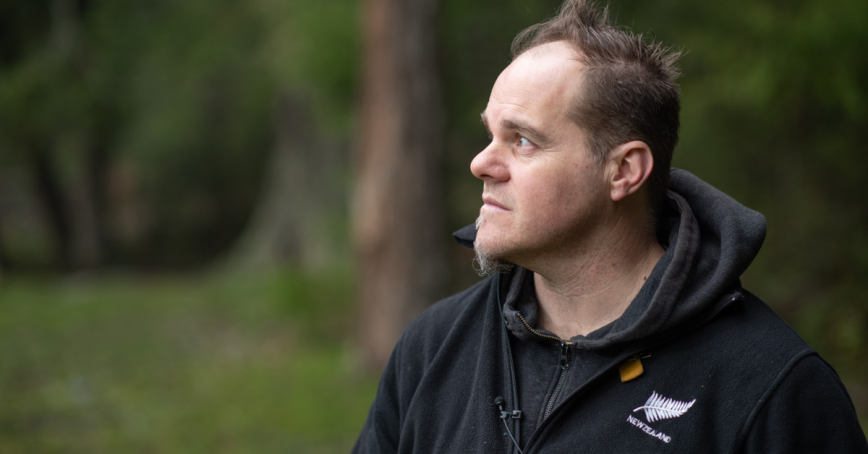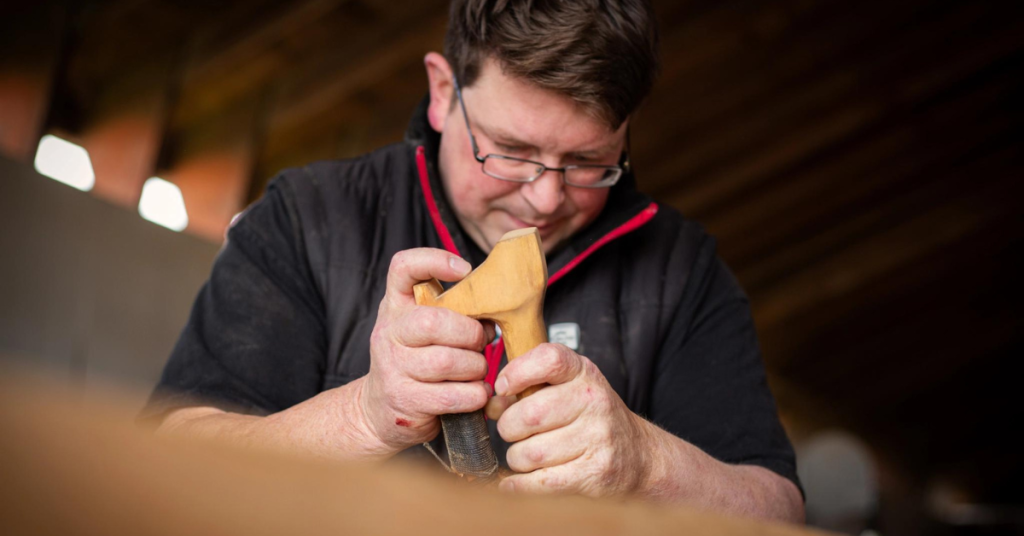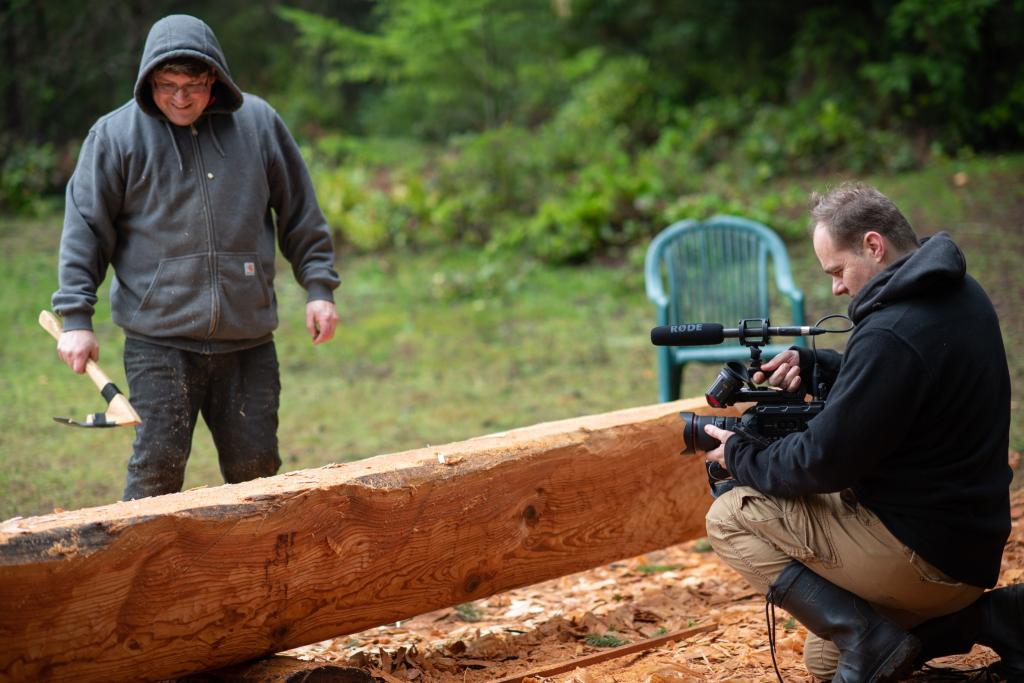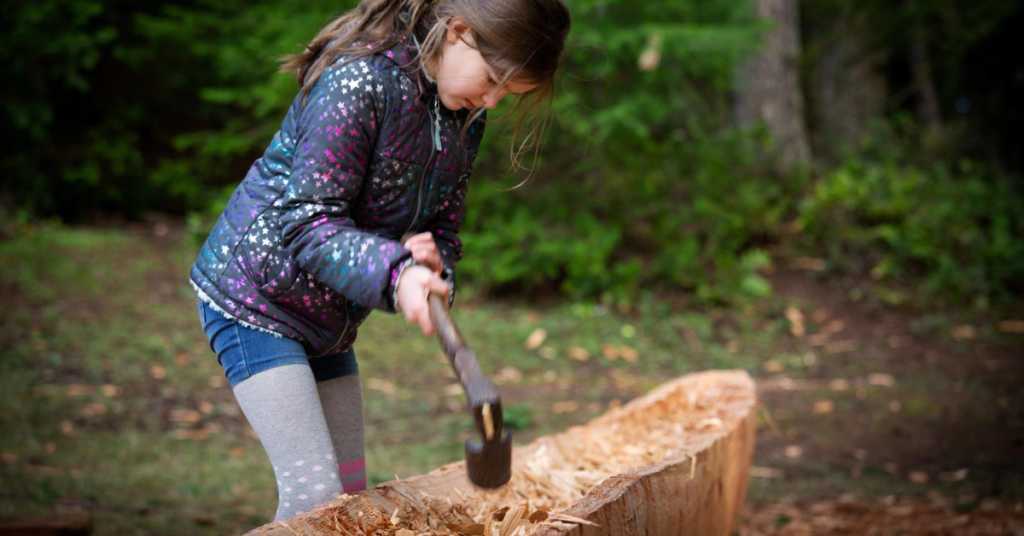A conversation with Phillip Vannini, director of “Our Teacher” film

Our Teacher focuses on Coast Salish canoe carver Beau Wagner as he works with the x’pey (western red cedar), carving what’s said to be the first dugout canoe since contact on Gabriola Island. But at its core, the film is much more; it’s a story about transformation.
Read the full feature story in Stories from cedar: New film by RRU prof. carves out a place for belonging.
We spoke with Royal Roads University Prof. Phillip Vannini, Our Teacher director, to learn more about making the film.
Q: How long did it take to complete the film?
A: The filming itself went from September to June, 2021. The editing was as short as you could imagine because the story just fell into place. It was almost automatic. It was seamless. It was three or four months, which for 59 minutes, is really quick.
Q: Your other films, such as Life off Grid, A Time for Making and Inhabited, involved speaking with many people – collecting many stores. This one focused only on Beau. What was that like?
A: It’s actually one of the things that attracted me to this project because I was then able to follow a single person, as well as the kids, as well as I was able to follow one object, that being the log and how it transformed into a canoe. That’s the point – spending so much time there, it was easy to show transformation and it was really powerful. When one tree’s story is told through its own transformation but also through traditional teachings, we start to see no longer a forest, but individual trees with stories. And that’s why I wanted to draw a lot of attention to what that little girl in the film – her name is Bella – means when she says, “I wonder how many stories this tree has?” And that’s the point, those are the stories that we don’t know. And because we don’t know those stories, we have no qualms cutting down trees, but if we started thinking about them as relatives, our attitude would be a lot different and it’s certainly something the kids understood.

“Trees are relatives. They are beings. They have their own spirits.” - Beau Wagner, Coast Salish carver
Q: Can you speak a little about the challenges you encountered in making the film?
A: Shooting in a school is never easy because there are permissions to contend with. I think the great thing is that when the parents got to see the early cut, they were immediately persuaded that they wanted their kids to be in this. Actually, some parents, as well as some teachers told us, “we had no idea this was even happening. All we would see is that kids would come home with wood chips.” The kids would go off and talk to Beau on their own off of class time and the teachers and parents had no idea about those conversations. It was sort of revealing to see what kids were learning and what parent wouldn’t love that. The challenges in the end were easy to surmount.
Q: In the film, there’s no narrator. Can you talk about your approach to storytelling in the film?
A: There is a narrator and the narrator is the canoe or the log itself. It tells the story of how it was chosen, brought to the school grounds to teach the children about nature and to teach the children about memories. I realised this was the story the tree wanted us to tell and Beau was very mindful of that too. So everything was kept in the order in which it was shot. There was never any trickery so to speak – any editorial wizardry. It was just a story that cedar wanted to share. I think the story is told by cedar.
Q: What other approaches did you take to storytelling?
A: When I realized that the children were very attached, I wanted to film from their eye level and from their perspective. So very early on, I made the point of shooting the whole thing from the eye level of the canoe because I just wanted the children to appear older and bigger.

“I made the point of shooting the whole thing from the eye level of the canoe because I just wanted the children to appear older and bigger.” – Phillip Vannini
Q: Can you talk about some of the most memorable moments in the film?
A: The day that the kids started carving. You see the image of the kids literally sitting Beau down in his chair, it was a day that wasn’t planned for. The kids felt simply that they had watched enough and they wanted to start working and neither Beau nor I or the teachers planned on that or intended for that. You can see it, Beau kind of sits down and he smiles, and he looks at me and I honestly thought, “what do we do. Do we let them?” This was not something that was planned. The canoe had drawn them in, so it was just great to be there to witness it.

At one point in the film, the kids felt they had watched enough, Vannini says. They wanted to start carving, too. “This was not something that was planned. The canoe had drawn them in, so it was just great to be there to witness it.”
Q: You’ve spoken before about the power of filmmaking to tell stories. Can you speak about using film as a medium to tell this story?
A: There are things I don’t think I’d be able to convey as powerfully through writing. I want to acknowledge the good work of composer and friend Antonio Gradanti. The combination of the rightly composed music and imagery and words has brought many people to tears during screenings. Some of us still have a hard time keeping our eyes dry when we’re watching this, just because the music accentuates so powerfully what’s going on. Antonio Gradanti’s work has been such an amazing addition to this story.
Q: What are your hopes for this film?
A: I have to quote Bella who says how great it would be for every kid in Canada to have a chance to take part in the Canoe Healing Program. The point of doing a documentary and sharing it is to inspire other teachers perhaps and principals to generate similar programs at their schools. That and doing honour to Beau’s teacher’s memory. The hope is to go outside of our Island community and inspire others to share traditional knowledge to kids in ways that they can understand and appreciate and love.
WATCH: Learn more about Phillip Vannini’s films and his approach to ethnographic research.
Our Teacher will be screened at upcoming film festivals including the Oakville Festivals of Film & Art June 21 to 27, Toronto Lift-off Film Festival, June 5 to July 3 and the 19th Annual ReelHeART International Film And Screenplay Festival July 3 to 9.
Interested in learning more about our programs in the School of Communication and Culture? Visit the programs page.